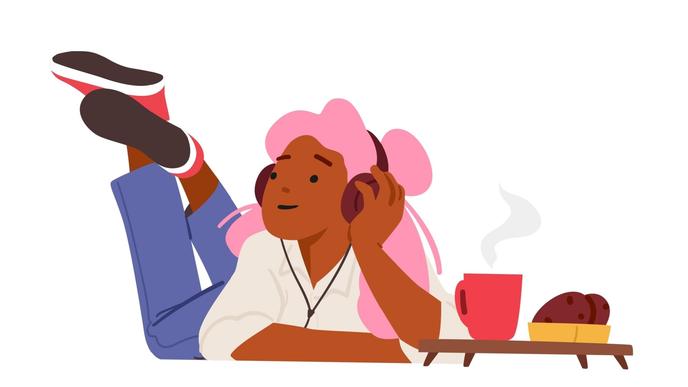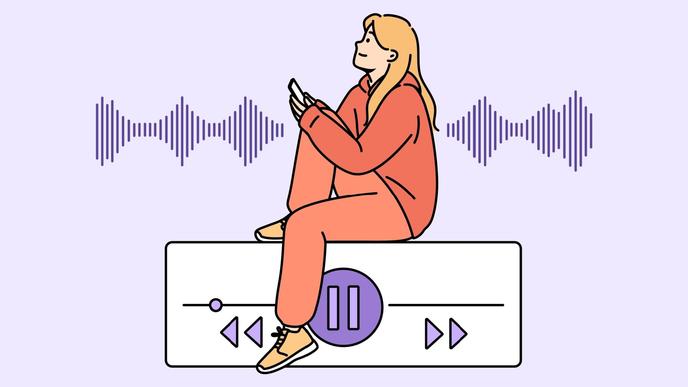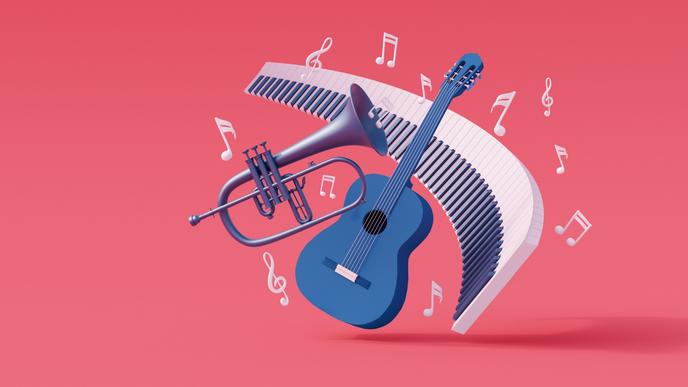Melodies of Success: What Music the World’s Richest People Listen To
Did you know that Elon Musk is a passionate fan of Frank Sinatra, Bill Gates is a devoted admirer of The Beatles and The Rolling Stones, and that Warren Buffett, Gordon Getty, James Irsay, and many other of the world’s wealthiest individuals play various musical instruments themselves?

Do you think there's a connection between their love of music and their multibillion-dollar fortunes? Definitely! And scientists have proven it.
Research into how musical compositions affect the brain and other systems of our body has been conducted for decades-even centuries. Pythagoras himself once said that music should be used to achieve harmony of the mind, soul, and body. Let's find out exactly how music can influence the human body and what we should listen to in order to become successful!
What Music Can Do

First and foremost, music helps us cope with stress and stabilizes our emotional state. According to research by Italian scientists, music therapy specifically contributes to reducing anxiety and easing symptoms of depression, dementia, stroke, and Parkinson's disease. When listening to music in these contexts, elevated cortisol levels gradually decrease, heart rate and breathing slow down, and people feel calmer. Moreover, musical compositions-especially classical music-improve sleep quality, enhancing overall well-being.
Music can also be effectively combined with work. According to a study conducted at one of France's leading universities, when a person listens to their favorite music, the body actively produces dopamine. This is a key element often called the "success hormone" because it influences memory, motivation, and attention. Therefore, music you personally enjoy can not only increase productivity but also enhance focus, while favorite melodies bring pleasure and help you complete even routine tasks more quickly. If you're doing monotonous work, music can relieve fatigue and drowsiness. Scientists believe this is because musical compositions elevate mood, increase satisfaction, and even boost creativity-contributing to the generation of new ideas.
In addition, music serves more practical functions. For instance, it can be your salvation from noisy and intrusive coworkers. It's common for people in shared workspaces to inadvertently disturb one another. In such cases, music and headphones become essential for a productive workday and a great way to avoid conflict with colleagues.
Why Playing Music Is Even More Beneficial
In reality, not only listening to music but also playing musical instruments enhances productivity and creativity. Reproducing melodies of varying complexity trains discipline and fosters self-control and concentration. To play any musical instrument, you must engage all areas of the brain and focus on a single task. A study by Italian scientists showed that people who practice music have significantly better memory. This is likely because learning to play any instrument requires serious concentration and effort. Of course, over time, it becomes easier to remember sounds and the notes that represent them. And that's how memory is trained.
But that's not the only advantage musicians have. They are also believed to feel happier and more successful. This is confirmed by a study conducted by researchers at the University of Delhi. Seventy people participated-half of whom practiced music, and the other half did not. They were asked to rate how happy they felt. The study showed that musicians felt more satisfied and content with life. They were in harmony with themselves and the world around them, experienced inspiration more often, and found it easier to concentrate while working. Thus, the benefits of playing music include not only personal growth and development but also maintaining stable emotional well-being, improving memory, and increasing life satisfaction.
What the Most Successful People in the World Listen to and Play

In reality, there is no single formula for what kind of music and how much of it one should listen to in order to become rich and successful. The main criterion is that you genuinely enjoy it. Musical preferences are largely shaped during childhood. The melodies that remind us of our earliest years bring pleasant emotions and elevate mood. Additionally, music tastes vary according to personality traits. American scientists found that extroverts are more likely to listen to jazz or pop, while introverts prefer rock and indie. There's also a direct connection between musical genres and personality types. For example, sanguines are true music lovers who might enjoy completely different styles, while phlegmatics usually pick one favorite genre for life. Cholerics tend to prefer heavy rock or metal, and melancholics choose music based on their fluctuating moods, often classical or pop.
That's why it's nearly impossible to determine a single most-listened-to genre among successful businesspeople, inventors, and investors. For example, media mogul and Meta co-founder Mark Zuckerberg especially enjoys hits by Lady Gaga and the French duo Daft Punk, known for blending electro, house, disco, and synth-pop. Surprising, right? Equally unexpected is the musical taste of Richard Branson. One of his many businesses is the record label Virgin Records. His favorite band is the British punk group Sex Pistols. Branson once saw future stars of alternative music in these rebellious youngsters, led by Steve Vicious, and signed them after two other labels had turned them down. Aside from the Sex Pistols, Branson also names singer-songwriter Peter Gabriel and multi-instrumentalist composer Mike Oldfield among his favorites.
Bill Gates, one of Microsoft's founders, has long remained true to his musical tastes, confidently listing The Beatles, U2, and The Rolling Stones as his favorites. He's also a fan of Broadway music. Space conqueror and head of SpaceX and Tesla Motors, Elon Musk, has more conservative preferences. His favorite singer is Frank Sinatra, and his favorite song is "Fly Me to the Moon": "I like the feeling of possibility, and it's really inspiring. And I'd very much like to go to the Moon." Musk also names Italian classical opera performer Andrea Bocelli as one of his idols, highlighting his "Con Te Partirò": "It's calming. And it's just a very beautiful song. Obviously, Andrea Bocelli is just an incredible singer. I think this song is a reminder of how beautiful our world is."
Moreover, many successful entrepreneurs and investors were once in musical groups and continue to play instruments in their spare time. For instance, billionaire and Microsoft co-founder Paul Allen played guitar, legendary trader Bruce Kovner played piano, and one of Google's founders, Larry Page, played saxophone. They all admit that music helps them relax and recharge between work, inspires, and motivates them.
Lectera’s Online Courses by topic
What to Do If You Don't Play Any Musical Instruments

Don't worry-success and recognition are achieved even by those who have never held a musical instrument. Music can still help you develop creativity, increase productivity, improve memory, and find motivation and long-awaited inspiration. To do this, you just need to choose the right compositions. For example, an American study found that Baroque music-from the 16th to 18th centuries-boosts mood and enhances focus during work. Among the iconic pieces from this era, Vivaldi's The Four Seasons is frequently recommended.
Classical music and instrumental compositions are considered the most beneficial for studying or working, when deep concentration is needed. In addition to classical music, natural sounds such as birdsong, rustling leaves, or the murmur of a waterfall are often used to enhance focus. These sounds mask distracting noise, calm the mind, and improve attention.
Epic music is a sure way to combat fatigue and drowsiness, gain energy, and boost motivation. When played during work, it makes you feel like you're creating something grand. It blends several genres, incorporates elements of folk and march music, and is characterized by rhythm, momentum, and dynamism.
Interestingly, soundtracks from video games are also used to achieve concentration and sustained attention. These usually fall under the electronic genre known as ambient, characterized by atmospheric, unobtrusive, and enveloping background sound. Game and movie soundtracks are often specifically designed not to distract from the main action, while helping maintain focus on the core task.
When performing monotonous tasks that don't require full engagement or focus, the best choice is something from the chillhop genre. These compositions combine elements of jazz, hip-hop, and electronic music.
Of course, it's important to note that calm music doesn't work for everyone when it comes to concentration, nor is energetic music always best for routine tasks. It all depends on you and your personal preferences. Experiment with different genres and styles, and observe how your body responds to different melodies. It's best to create a few playlists with songs for active work, routine tasks, rest, and resource recovery.
Ultimately, it doesn't matter whether we create our own music or simply enjoy popular tracks-music allows us to tune into ourselves and our true desires, delve deep within, and discover the inspiration and strength to achieve new accomplishments and generate truly breakthrough ideas!
Share this with your friends via:
Latest News

In the UK, £23 million has been allocated for the expansion of the EdTech Testbed program — pilots of educational technologies in schools and colleges.

In the US, Tuskegee University announced the launch of Tuskegee University Global Campus (TUGC) — a new online platform for distance learning.

A significant stage in the development of the alternative education system has begun in West Northamptonshire in the UK: the County Council is actively calling on parents, guardians, and trustees to participate in shaping the future of this key area.

Outwoods Primary School in Atherstone, Warwickshire, having experienced deep sadness after the loss of their famous cat, Silla, has found solace in a new pet – a Maine Coon named Aloysius O’Hara.

In modern universities, artificial intelligence, and in particular ChatGPT, is rapidly transforming from a controversial tool into a full-fledged student assistant.












 Spring skills audit: what to remove, strengthen, and “sow” in learning
Spring skills audit: what to remove, strengthen, and “sow” in learning
 9 Career Mistakes Young Professionals Make
9 Career Mistakes Young Professionals Make
 £23 million allocated for the expansion of EdTech Testbed in the UK
£23 million allocated for the expansion of EdTech Testbed in the UK
 Test: How Psychologically Mature Are You? Check Your Inner Foundation.
Test: How Psychologically Mature Are You? Check Your Inner Foundation.
 Test. Check Your Social Media Dependency Level!
Test. Check Your Social Media Dependency Level!
 Test: What Business is Right For You?
Test: What Business is Right For You?
